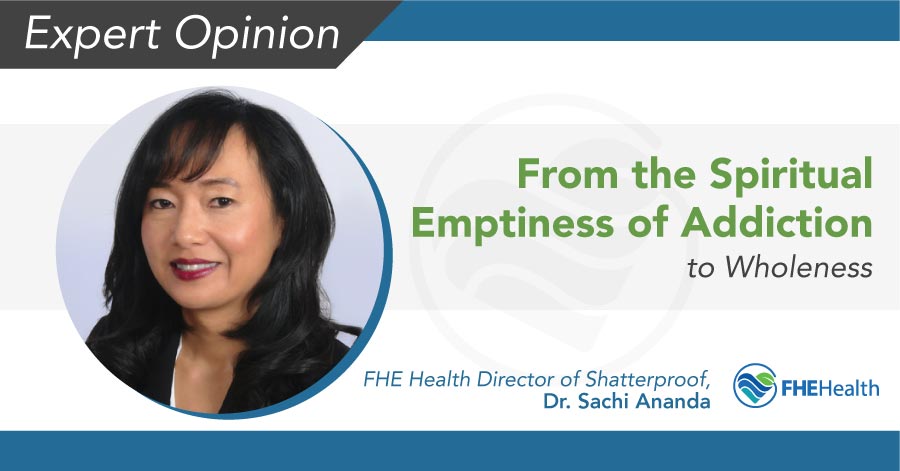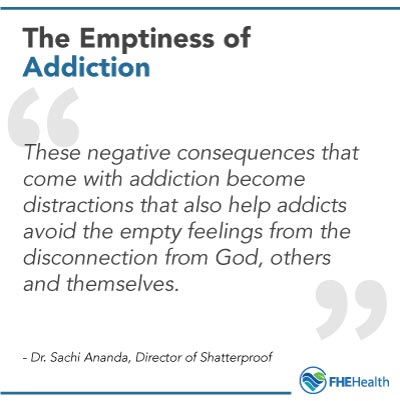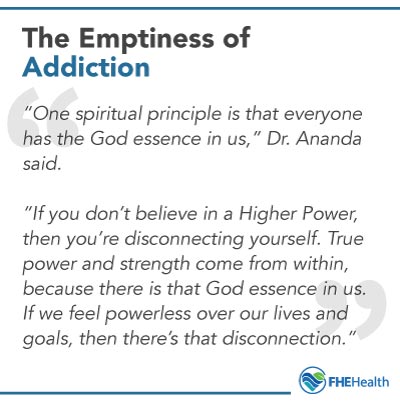
This article has been reviewed for accuracy by our peer review team which includes clinicians and medical professionals. Learn more about our peer review process.
When experts say addiction is a “complex” disease, they mean it has multiple roots. In addition to the genetic and biological factors that may be at play, there can often be mental, emotional, even spiritual causes.
In fact, quite a large body of research has found that spirituality can play an important role in recovery from alcoholism or drug addiction. For example, studies have shown that higher levels of spirituality correlate with lower rates of relapse among people in recovery.
These findings seem to bear out in people’s personal stories, too. Many people in recovery describe their past life when active in addiction as a kind of “spiritual emptiness.” But what does that really mean, and if addiction and relapse are more likely in a state of spiritual emptiness—how do you address the emptiness?
Few are better qualified to answer these questions than Dr. Sachi Ananda, who is the director of FHE Health’s Shatterproof treatment program for first responders. Dr. Ananda is a believer in the healing power of spirituality. She often incorporates elements of spirituality, such as gratitude journaling and the Serenity Prayer, into the therapy groups that she leads. In a recent interview, she explained the concept of spiritual emptiness and its relationship to addiction and recovery. Here is what she had to say….
Spirituality and Addiction – What Emptiness Has to Do with Addiction
 What does spiritual emptiness have to do with addiction? To answer this question, Dr. Ananda began with a definition of spiritual emptiness:
What does spiritual emptiness have to do with addiction? To answer this question, Dr. Ananda began with a definition of spiritual emptiness:
Emptiness is the hole in the heart that addicts may want to fill with a quick fix like drugs and alcohol. Drugs and alcohol become the addict’s Higher Power that instantly solves their problems and takes away these deep feelings of emptiness.
Of course, the problem with drugs and alcohol is they are a poor substitute for a Higher Power, one that “usually comes with a lot of negative consequences such as physical ailments, relationship problems, poor job performance, legal issues, etc.” Dr. Ananda noted that even “these negative consequences that come with addiction become distractions that also help addicts avoid the empty feelings from the disconnection from God, others and themselves.”
The Meaning of the “Spirituality of Addiction”?
In other words, spiritual emptiness is a “spiritual root” of addiction, although it, too, has a cause— “disconnection from oneself, from others and from one’s Higher Power.” Insofar as is possible to speak of a “spirituality of addiction,” this problem of disconnection would be it.
“One spiritual principle is that everyone has the God essence in us,” Dr. Ananda said.
“If you don’t believe in a Higher Power, then you’re disconnecting yourself. True power and strength come from within, because there is that God essence in us. If we feel powerless over our lives and goals, then there’s that disconnection.”
How Relapse Is More Likely if You Don’t Address the Spiritual Emptiness
 When you are disconnected from yourself, others and/or your Higher Power, you are probably going to feel spiritually empty; and a common human tendency is to look for things to fill that void, like drugs and alcohol. That is how relapse is more likely for someone who has not addressed a condition of spiritual emptiness.
When you are disconnected from yourself, others and/or your Higher Power, you are probably going to feel spiritually empty; and a common human tendency is to look for things to fill that void, like drugs and alcohol. That is how relapse is more likely for someone who has not addressed a condition of spiritual emptiness.
But there is more to understanding how “relapse is more likely to happen without a spiritual foundation,” according to Dr. Ananda. In the absence of a spiritual foundation, a person may be tempted to think that all they need to stop using drugs and alcohol is “sheer willpower.” Dr. Ananda explained:
Willpower may help for a time but without help from God or a Higher Power it is more difficult to sustain sobriety. Also, what may happen is the addict may switch their addiction with another external item to become addicted to, in order to fill the emptiness. The only thing that can provide permanent emotional fulfillment in a constantly changing external world is God.
When Addressing Addiction and Spirituality
If unaddressed spiritual emptiness and disconnection can make you more vulnerable to relapse, how do you address it? How do you build the “spiritual foundation” that is so critical to successful long-term recovery?
Symptoms of Spiritual Emptiness to Look for
The first step is to be more mindful of potential symptoms of spiritual emptiness. Many people are not even aware that spiritual emptiness and disconnection may be fueling their drug or alcohol problem. Dr. Ananda said the following signs can be symptoms of spiritual emptiness:
- An inability to stay in the moment and a need to escape through drugs and alcohol
- Lack of meaning and purpose – “This can lead to depression,” and in turn the use of substances to elevate mood.
- Low self-worth – Without the assurance that God’s essence is “within everyone,” a person may feel “chronic low self-esteem fueled by negative self-talk and self-judgment.”
- A lack of gratitude – Gratitude can help a person “look at what one has rather than what one doesn’t have.”
- Resentment and unforgiveness – “If you are disconnected or alienated from others, you see a person as different and separate from you, and it’s hard to forgive others and easy to hold resentments.”
- Judgment of others and self-judgment
Get More Plugged in
These signs could indicate a need for more connection—connection with oneself, one’s Higher Power and others—in which case it may be time to get more plugged in. Dr. Ananda suggested the following ways to do that:
- Join a spiritual or religious group – “Look for spiritual groups that encourage the exploration of direct experience of God and avoid groups that instill fear.”
- Participate in the Alcoholics Anonymous/Narcotics Anonymous program – AA and NA approach addiction as a “spiritual disease,” with the “simple concept that there is a power greater than us.”
- Meditate – “Explore different types of strategies and practices to meditate. Meditation allows you to sit with yourself and feel the emptiness, in order to eventually go beyond it to peace.”
Alcoholism and Spirituality – Asking for Help from a Higher Power
In addition to meditation, Dr. Ananda shared a tip she heard when training to become an addiction-certified therapist. One of her supervisors told her that when someone has a craving to drink against their will—and they know they don’t want to drink but the craving is “so overpowering”— “the only thing to do is ask for God’s help. That’s the only way to get through that craving.”
Sometimes the spirituality of recovery may be as simple as just asking for help from a power higher than oneself.






